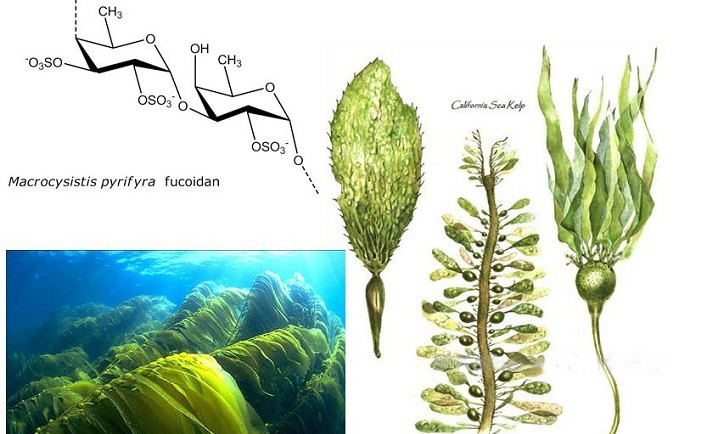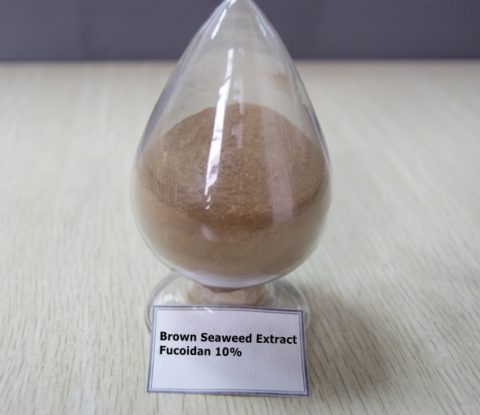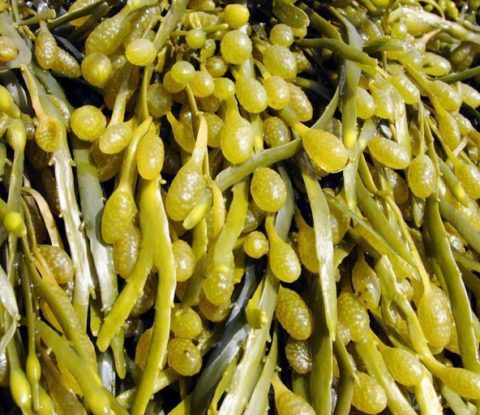
Brown Seaweed Extract, Brown Algae Powder, Fucoidan, Laminarin, Fucoidan Sulfate 85% HPLC
Fucoidan sulfate has the functions of anticoagulant, lipid-lowering, heavy metal detoxification and anti HIV in medicine. It has become one of the most important marine drugs. Fucoidan sulfate is used in the treatment of nephrotic syndrome and chronic renal failure. For chronic renal failure, it can reduce urea nitrogen, blood creatinine, improve renal function and delay the progress of the disease.
Brown Seaweed Extract Powder, Brown Algae Extract Powder
[botanical source]: the thallus of Laminaria japonica arsch.
[active ingredient]: Fucoidan, laminarin, fucoidan sulfate, FSP
[Specification]: 10%, 85% HPLC, 10:1, 20:1 TLC
[Formula Formula]: c42h58o6
[CAS No.]: 3351-86-8
[other ingredients]: a small amount of galactose, mannose, xylose, glucose, arabinose, glucuronic acid, protein, potassium, sodium, calcium, magnesium and other metal ions.
[appearance]: it is brownish gray to offwhite powder according to its purity.
[particle size]: 80 mesh
[storage conditions]: the product should be sealed and stored in a dry, cool and well ventilated place.
[packaging]: 1kg / aluminum foil bag, 25kg / cardboard bucket (double plastic bag and outer cardboard bucket are used inside).
[shelf life]: 24 months from the production date.
 Brown seaweed extract fucoidan is a sulfated polysaccharide (MW: average 20,000) found mainly in various species of brown algae and brown algae such as mozuku, kombu, bladderwrack, wakame, and hijiki (variant forms of fucoidan have also been found in animal species, including the sea cucumber). Fucoidan is used as an ingredient in some dietary supplement products.
Brown seaweed extract fucoidan is a sulfated polysaccharide (MW: average 20,000) found mainly in various species of brown algae and brown algae such as mozuku, kombu, bladderwrack, wakame, and hijiki (variant forms of fucoidan have also been found in animal species, including the sea cucumber). Fucoidan is used as an ingredient in some dietary supplement products.
Fucoidan designates a group of certain fucose-containing sulfated polysaccharides (FCSPs) that have a backbone built of (1→3)-linked α-l-fucopyranosyl or of alternating (1→3)- and (1→4)-linked α-l-fucopyranosyl residues, but also include sulfated galactofucans with backbones built of (1→6)-β-d-galacto- and/or (1→2)-β-d-mannopyranosyl units with fucose or fuco-oligosaccharide branching, and/or glucuronic acid, xylose or glucose substitutions. These FCSPs offer several potentially beneficial bioactive functions for humans. The bioactive properties may vary depending on the source of seaweed, the compositional and structural traits, the content (charge density), distribution, and bonding of the sulfate substitutions, and the purity of the FCSP product. The preservation of the structural integrity of the FCSP molecules essentially depends on the extraction methodology which has a crucial, but partly overlooked, significance for obtaining the relevant structural features required for specific biological activities and for elucidating structure-function relations.(1)
There are at least two distinct forms of fucoidan: F-fucoidan, which is >95% composed of sulfated esters of fucose, and U-fucoidan, which is approximately 20% glucuronic acid. The physiological and biochemical effects of fucoidan have been examined in several small-scale in vitro and animal studies. In a small study of rabbits, F-fucoidan injected intramuscularly was reported to inhibit neointimal hyperplasia, or re-narrowing of the artery, after placement of stents in the iliac arteries.(2) and induce apoptosis in isolated human lymphoma cell lines in vitro.(3) It has been hypothesized that these two effects may involve a common mechanism, but the evidence is inconsistent and no mechanism for the putative induction of apoptosis by fucoidan has been identified.(4) A study in rats indicated that pre-treatment with fucoidan increases mortality subsequent to meningitis infection.(5) In a clinical study, orally-ingested Undaria-derived-fucoidan was reported to produce a small increase in the total number of CD34+ cells, and a more pronounced increase in the proportion of CD34+ cells that expressed CXCR4 (connected to over 23 types of cancers). The authors of the study hypothesized that the ability of fucoidan to mobilize hematopoetic cells with high levels of CXCR4 expression could be clinically valuable.(6)
Health benefits of brown seaweed extract fucoidan
1. Fucoidan can induce cancerous cells apoptosis
One of the major benefit of brown seaweed fucoidan is that it induces apoptosis. Apoptosis is a process of programmed cell death that occurs in multicellular organisms. Biochemical events lead to characteristic cell changes (morphology) and death. These changes include blebbing, cell shrinkage, nuclear fragmentation, chromatin condensation, chromosomal DNA fragmentation, and global mRNA decay. Between 50 and 70 billion cells die each day due to apoptosis in the average human adult. Apoptosis is beneficial as it helps the cancerous cells to commit suicide. Some research has indicated that the active component of brown seaweeds, which is fucoidan, helps in the death of several dangerous and tumor containing cells. People of different countries, especially those living in Japan and Korea, have been eating brown seaweeds as a part of their diet for a long time. Fucoidan is extracted from brown seaweeds and structurally it consists of many polymers which are formed by branched polysaccharides sulfate esters having L-fucose building block. There have also been some recent studies which indicate that fucoidan induces apoptosis in cancerous cells. But the whole mechanism is a bit doubtful because it is still uncertain which sequence of fucoidan plays an important role in the process of apoptosis. A study was recently conducted in Japan in the KyushuUniversity. The study showed that fucoidan induces apoptosis in the breast cancer cells (MCF-7) and it doesn’t affect the normal epithelial cells. Caspase-8 is also considered very important for the apoptosis induced by fucoidan. Another study was conducted as late as Sep 2014 by researchers S. Chen and Y.Zhao (7). The study was basically done to know about the anti-cancer properties of fucoidan. The results of the study showed that fucoidan has anti-cancerous properties. The results also showed that there is some evidence of the therapeutic application of fucoidan in cancer.
2. Fucoidan can inhibit angiogenesis
Angiogenesis basically means the formation of new blood vessels. It has been seen that angiogenesis plays a key role in the promotion of cancer. Some recent studies have indicated that the sulfated polysaccharides inhibit angiogenesis. The anti-tumor activity of fucoidan has gotten special attention recently. The anti-tumor effect of “Mekabu” fucoidan is effected by IFN-y-activated NK cells. It has also been observed that the antitumor activity of fucoidan is due to its anti-angiogenic potential. Scientists at the QingdaoUniversity recently evaluated several harvested tumors in order to know the effect of fucoidan on angiogenesis. The results of the study showed that fucoidan causes a significant decrease in the intratumoral expression of blood vessles as compared to the control group. The scientists also studied the effect of fucoidan on lung metastasis of breast cancer in the same study. It was found that 4T1 cells is highly invasive in spreading breast cancer cell lines. Scientists euthanized mice to find the effect of fucoidan on 4T1 tumor. The results of the study showed that fucoidan results in fewer lung metastasis. The total number of nodules per mouse in the control group were 34. Another study was recently conducted in China in the DalianMedicalUniversity to find the effect of fucoidan on angiogenesis (8). The researchers of the study took umbilical vein endothelial cells and found out the anti-angiogenic activity of fucoidan extracted from brown seaweed. The researchers of the study treated the HUVECs with different concentrations of fucoidan. The results of this study showed that fucoidan helps in the inhibition of cell migration, cell proliferation and tube formation.
3. Fucoidan can enhance immune system
Brown seaweed extract fucoidan can effectively boost the immune system. This means it can help with any gastrointestinal issues since our digestive system is highly reliant on this system. One of its active ingredients is fucose, a healing sugar that benefits the body and works to help fight off viruses and diseases. This extract contains all 8 essential saccharides (sugar molecules) that are good for your body’s cellular communication, and also contains over 50 trace minerals that help you fight common colds. This is why it is great to take even if you aren’t sick! It acts as a great booster for all of the stresses and toxins that reach our bodies every day. This super seaweed acts as an immune enhancer with its natural antiviral properties and is an antioxidant for the reduction of free radicals in the body. It relieves allergies and arthritis because of its natural anti-inflammatory effects. Different polysaccharides like fucoidan which has been obtained from different natural sources are biological response modifiers and increase the different immune responses. So, fucoidan directly stops the production of tumor cells in the body. Fucoidan also helps in the diffusion of the tumor cells and enhances the immunomodulatory activities of the body. The quantity of macrophages in the body is also increased due to fucoidan and helps in the destruction of tumor through the Type 1 T-helper cell. A research was conducted in 2003 which showed that fucoidan has anti-tumor properties in it (9).
4. Fucoidan can improve body endurance and against fatigue
A study was recently conducted in Tottori University in Japan which analyzed if brown algae extract fucoidan helps the patients from different anti-cancer drugs. Some of the common side effects of anti-cancerous drugs are vomiting, nausea, fatigue, diarrhea and bone marrow suppression. Peripheral neuropathy is specific for oxaliplation, which treats the cancer of the colon or rectum. It was found in the research that fucoidan stops the occurrence of fatigue in colorectal cancer patients in chemotherapy. Fatigue is dangerous for the human body and it has been observed that fatigue reduces the individual resources of the patients. It also affects the nutritional status of the individual, and has a negative effect on the bone density of the therapy of cancer. It has been seen that fatigue is present in more than 30% patients of chemotherapy. The grade 2 and 3 fatigue was found in 60% of colorectal cancer patients with chemotherapy, in this study. Fatigue was also treated by the use of antidepressants. The study showed that patients who received fucoidan were able to go through the pain of prolonged chemotherapy without fatigue. But fucoidan didn’t affect the other adverse side effects of anti-cancer drugs. But the problem is that the main mechanism which explains the chemotherapy-induced fatigue is yet to be determined and there are no treatment currently available for alleviating the symptoms.
5. Cardiac health
It has been found that fucoidan is quite beneficial for the cardiac health. A person may be able to save himself from heart muscle injuries, like heart attack by taking a fucoidan supplement or a fucoidan-rich food. An animal study was recently conducted by some Indian researchers in which the researchers sought to find the relation between fucoidan and cardiac health. The rat subjects were used in this study and they were given a special diet of fucoidan, which was extracted from Turbinaria conoides, which is a species of brown seaweed. Heart injury was given to the rats who hadn’t received the fucoidan rich diet. All the rats were then exposed to battery tests in order to measure the degree which they had survived. There was lesser degree of injury in the animals which weren’t given fucoidan. The researchers gave the view through the research that fucoidan strengthens the heart muscles. This was published in the June 2012 finding of “International Journal of Biological Macromolecules”.
6. Fucoidan could help to keep the blood thinning
One of the chief benefits of fucoidan is that it has anticoagulant properties. This basically means that it helps in the thinning of the blood in the body, which is quite helpful in preventing and treating certain types of conditions which include pulmonary embolism, phlebitis, and heart attack or a stroke caused by a blood clot. But some experts warn that fucoidan should specially be avoided by people who are taking different kinds of blood thinning medications which include warfarin and heparin.
7. Radiation properties
Some experts have suggested that brown seaweed/algae extract fucoidan has radiation properties present in it. A famous nutritionist Phyllis Balch who is also the author of the book “Prescription for Dietary Wellness: Using Foods to Heal”, has the view that fucoidan can be of great help against the damaging effects from radiation exposure. A study was recently published in the 2004 journal of “Health Physics”. The study showed that the sodium alginate present in fucoidan helps to prevent the absorption of radioactive strontium from contaminated milk. The researchers of the study had the view that the brown algae was highly effective and didn’t have any major side effects.
8. Atherosclerosis
Some physiological risk factors to cardiovascular health include high blood pressure, lipoprotein levels, increased serum cholesterol levels, increased fibrinogen levels and increased serum glucose levels. The major reason that the cardiovascular diseases are caused is due to the “hardening” or narrowing of the coronary arteries, which is known as atherosclerosis. The Atherosclerosis develops in the body when the fatty deposits infiltrate into the walls of arteries and result in the formation of plaque. Some of the early developments of this serious condition are the sticking of monocytes and other leucocytes to the vascular wall in the blood. The main catalysts present in this event are those present within the wall, known as oxidized lipoprotein particles (also call ox-LDL). An inflammatory response is caused by ox-LDL. The platelets get attached to the monocytes and the blood vessel cells, which ingest the ox-LDL to form different foam cells. Due to this, a fat streak forms which generally increases the number of smooth muscle cells and causes their migration to the outer edge of the arterial wall, which forms a hard and fibrous layer.
A rat study which was recently conducted which proved that brown seaweed extract fucoidan has lipid lowering properties in hyperlipidemic animal models and it decreases the concentrations of triglycerides, low-density lipoprotein cholesterol and serum total cholesterol (10). The rats were fed for 28 days to establish hyperlipidemia. Fucoidan was delivered in dosage forms of 0.1, 0.2 and 0.4 g/kg for a period of additional 28 days. The three doses showed that they had lipid lowering properties. The middle dosage (0.2 g/kg) seemed to have the biggest effect. So, one of the benefits of brown seaweed extract fucoidan is that it increases the levels in lipid metabolizing enzymes. It was found that fucoidan induces the apolipoprotein C-II and lipoprotein lipase in a time-dependent manner. It was also found that fucoidan increases the LPL protein expression and LDL mRNA. It was also suggested in the results of the study that this secretion which is done by fucoidan may play some role in clearing the plasma triglycerides. The effects of fucoidan were compared with heparin.
9. Promote the health of the gastrointestinal system
The gut diseases are common these days. The gut health is basically related to complex environment which is related to acidity and neural control. It has been found that brown seaweed extract fucoidan can be of great help in improving gut health. One of the major diseases caused by a disoriented gut is inflammatory bowel disease (IBD). Basically the acute flare-ups are accompanied by the passage of a large number of leukocytes into the intestinal walls. The transmigration of leukocytes occurs in several different steps which include chemoattraction, tight adhesion, rolling adhesion and endothelial transmigration. Basically the leukocyte rolling is controlled by the selection family of adhesion molecules in the vivo. It has been seen that the intake of fucoidan inhibits the selectin and has also shown to inhibit leukocyte rolling in different tissues. It was found in a mouse colitis model that the treatment with fucoidan leads to a reduction in crypt destruction in the colon and mucosal damage. It has also been seen that fucoidan reduces the colonic myeloperoxidase (MPO) activity in the mouse which have been exposed to DSS. The results of the study showed that brown seaweed extract fuoicdan controls the tissue damage and leukocyte infiltration. This data is in line with the fact that fuoicdan helps in the treatment of inflammatory bowel disease.
Reference:
1. Ale, Marcel Tutor; Mikkelsen, Jørn D; Meyer, Anne S (2014). “Important Determinants for Fucoidan Bioactivity: A Critical Review of Structure-Function Relations and Extraction Methods for Fucose-Containing Sulfated Polysaccharides from Brown Seaweeds”. Marine Drugs. 2106 (10): 2130. doi:10.3390/md9102106.
2. Jump up ^ Jean-François Deux; Anne Meddahi-Pellé; Alain F. Le Blanche; Laurent J. Feldman; Sylvia Colliec-Jouault; Françoise Brée; Frank Boudghène; Jean-Baptiste Michel; Didier Letourneur (2002). “Low molecular weight fucoidan prevents neointimal hyperplasia in rabbit iliac artery in-stent restenosis model”. Arteriosclerosis, Thrombosis, and Vascular Biology. 22 (10): 1604–9. doi:10.1161/01.ATV.0000032034.91020.0A. PMID 12377737.
3. Jump up ^ Aisa Y, Miyakawa Y, Nakazato T, Shibata H, Saito K, Ikeda Y, Kizaki M (Jan 2005). “Fucoidan induces apoptosis of human HS-sultan cells accompanied by activation of caspase-3 and down-regulation of ERK pathways”. American Journal of Hematology. 78 (1): 7–14. doi:10.1002/ajh.20182. PMID 15609279.
4. Jump up ^ Wu XZ, Chen D (September 2006). “Effects of sulfated polysaccharides on tumour biology”. West Indian Med J. 55 (4): 270–3. PMID 17249315.
5. Jump up ^ Brandt CT, Lundgren JD, Lund SP, Frimodt-Moller N, Christensen T, Benfield T, Espersen F, Hougaard D, Ostergaard C (2003). Pretreatment with fucoidan promotes lethal infection in a rat model of experimental pneumococcal meningitis. Interscience Conference on Antimicrobial Agents and Chemotherapy. Chicago, Illinois. ISBN 978-1-55581-284-3.
6. Jump up ^ Irhimeh MR, Fitton JH, Lowenthal RM (Jun 2007). “Fucoidan ingestion increases the expression of CXCR4 on human CD34+ cells”. Exp Hematol. 35 (6): 989–94. doi:10.1016/j.exphem.2007.02.009. PMID 17533053.
7. Chen S. et al., Fucoidan induces cancer cell apoptosis by modulating the endoplasmic reticulum stress cascades. PLoS One. 2014 Sep 18;9(9):e108157. doi: 10.1371/journal.pone.0108157. eCollection 2014.
8. Liu F., et al., Fucoidan extract derived from Undaria pinnatifida inhibits angiogenesis by human umbilical vein endothelial cells. Phytomedicine. 2012 Jun 15;19(8-9):797-803. doi: 10.1016/j.phymed.2012.03.015. Epub 2012 Apr 15.
9. Maruyama H et al., Antitumor activity and immune response of Mekabu fucoidan extracted from Sporophyll of Undaria pinnatifida. In Vivo. 2003 May-Jun;17(3):245-9.




